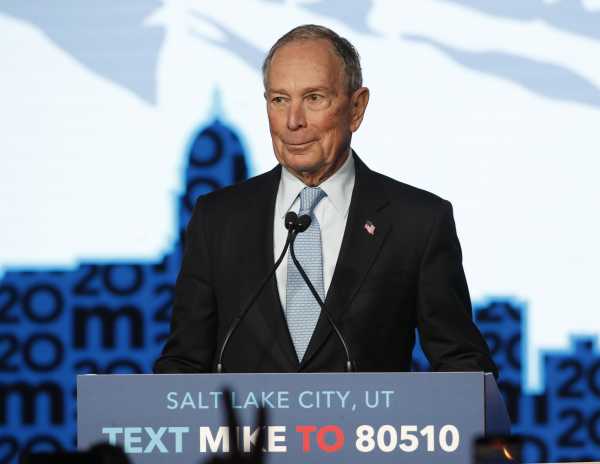
This story is part of a group of stories called

Uncovering and explaining how our digital world is changing — and changing us.
On Monday, presidential hopeful and former New York City Mayor Mike Bloomberg’s campaign posted — and then deleted — several controversial tweets about rival Sen. Bernie Sanders that prompted confusion and tested the rules of what political campaigns can share on social media.
The tweets, which Bloomberg’s campaign called satire, featured fictitious quotes attributed to Sanders, in which Sanders appeared to praise dictators like Kim Jong Un, Bashar al-Assad, and Vladimir Putin, with the hashtag “#BernieonDespots.”
While the tweets are now gone, people are continuing to debate social media companies’ responsibilities when it comes to policing political speech online. Though Twitter and other platforms have implemented rules that limit the sharing of certain types of political misinformation, controversy abounds.
The Bloomberg campaign posts are another example of how much confusion exists online about what’s true and what’s not, and what’s the difference between a joke or an attack — and how finding a clear answer often depends on context and nuance that doesn’t always come through clearly in a tweet or a Facebook update.
With the Bloomberg campaign’s tweets about Sanders, for example, the account followed up on the thread by tweeting, “To be clear — all of these are satire — with the exception of the 60 Minutes clip from last night.” (Sanders recently said on the CBS program that he opposes the authoritarian regime of Cuba’s late Fidel Castro, but that it’s “unfair to simply say everything is bad” about the leader, such as a mass literacy program he implemented).
To many, it was obvious these tweets were an attempt at a joke. But others criticized the Bloomberg campaign for posting what they saw as a misleading attempt to smear Sanders using fabricated quotes.
When the series of tweets were viewed together, it was more obvious that they were satirical. But the fake Sanders quotes appeared on some people’s Twitter feeds in isolation — lacking context, seemingly serious to some, and all the more confusing. It’s just one of several recent instances where Bloomberg’s tweets, sponsored memes, and other social media activity have tested the boundaries about what is allowed on social media.
Even when they’re not being satirical, politicians generally have a lot of leeway in what they can say on social media without violating company rules around misinformation or hate speech. President Trump has repeatedly tweeted false statements about everything from his impeachment proceedings to immigration, and he has posted media that some see as inciting violence toward political opponents. All of this has remained on Twitter because the company considers Trump’s posts newsworthy, despite calls for the company to take them down.
And Facebook (unlike Twitter and YouTube) continues to enforce a controversial policy that allows lies in political ads, such as the Trump campaign’s ad making false claims about the activities of former Vice President Joe Biden and his son in Ukraine. Democratic candidate Sen. Elizabeth Warren has tested those boundaries by running a fake ad claiming Facebook CEO Mark Zuckerberg endorsed Donald Trump for president, meant to be a critique of the rule.
Twitter, like other major social media companies, doesn’t ban content just because it’s false or potentially misleading, but it does have a set of rules barring any content that’s considered “platform manipulation” or “spam.” A spokesperson for Twitter told Recode that the Bloomberg campaign’s specific tweets falsely quoting Sanders didn’t violate any of its current rules on the site.
If Bloomberg’s campaign had posted an edited image, like a fake screenshot (as opposed to text) of Bernie making fictitious statements, then it would likely be a violation of Twitter’s upcoming manipulated media policy that is rolling out on March 5.
The spokesperson also told Recode, “Admittedly, satire is a challenging one. Context of the content is important. As it pertains to the synthetic and manipulated media rule it is pretty well explained in the blog in that we evaluate the potential impact of the media i.e. is the content in question ‘shared in a deceptive manner.’”
Twitter’s policy is far from clear and will continue to require some subjective calls on what is and isn’t a joke. The rules on Facebook or YouTube are not much clearer because every major tech company is grappling in 2020 with how to balance users’ free speech with their ability to do harm.
Meanwhile, Bloomberg consistently (and perhaps smartly) continues to push the boundaries of these platforms’ rules — garnering criticism, but also getting free publicity.
Last Friday, Twitter suspended 70 pro-Bloomberg accounts run by people paid by the Bloomberg campaign who were posting identical tweets in favor of the candidate. Twitter said the accounts violated its policies on “platform manipulation and spam.” In this case, because the language of many of the posts were word-for-word copies of the same coordinated language, it was a clear violation of the platform’s rules.
The campaign also posted a doctored video of the last Democratic presidential debates that made it seem as though Bloomberg had an “epic mic drop” moment that stumped his opponents — even though, as my colleague Alex Ward explained, he didn’t.
The campaign has more broadly been paying people $2,500 a month to post positive content about Bloomberg on social media and text their friends about him. And it’s paying much more to big-name influencer Instagram accounts to post ironic memes about the candidate.
In every case, Bloomberg has received criticism, and in some cases, social media companies have hit the candidate with a slap on the wrist for these tactics that blur the lines between spam, misinformation, and clear advertising.
But in the end, the publicity may be well worth any criticism. Whether you agree with it or not, Bloomberg is smartly exploiting the gray areas social media companies have established around politics and free speech online. It’s a difficult problem that will only get more complicated for social media platforms as we get closer to Election Day.
Sourse: vox.com






